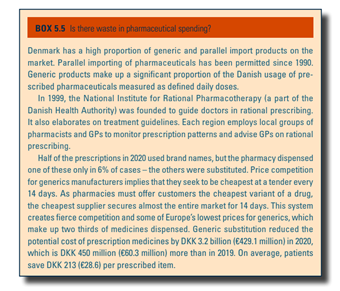-
14 February 2025 | Country Update
New agreement on strengthening the role of pharmacies in primary healthcare
5.6. Pharmaceutical care
Denmark has a considerable and growing biopharmaceutical industry with 135 pharmaceutical companies in 2019, with several domestic companies researching and manufacturing pharmaceutical products.
Any pharmaceutical product with marketing approval from the Danish Medicines Agency or European Medicines Agency can be distributed by community and hospital pharmacies. Denmark has three wholesalers distributing medicines to private pharmacies and other wholesalers that only distribute medicines for veterinary use. Wholesale prices are fixed through individual negotiations between the manufacturers or importers and the wholesalers; the prices are generally determined through competitive tendering.
Community pharmacies are private entities subject to comprehensive state regulation (see section 2.7.4). A collective financial equalization system is in place, under which pharmacies with above-average turnovers contribute to pharmacies with below-average turnovers. The Health Act states that the regions pay a share of the cost for prescription medicines that the Danish Medicines Agency has approved. Co-insurance may also be given for outpatient medicines prescribed by a doctor (see section 3.4.1).
In 2021, there were 512 pharmacies and pharmacy branches (including two online pharmacies, 24 pharmacy outlets, around 350 over-the-counter sales points) and about 300 affiliated medicine delivery facilities (Danmarks Apotekerforening, 2021a). Since 2001, other outlets, such as supermarkets and kiosks, have been permitted to sell over-the-counter medicines. Since 2015, pharmacies have been given more opportunities to open branches, resulting in 67% more pharmacies opening (Danmarks Apotekerforening, 2021b). The pharmacies’ share of over-the-counter medicines was 69% in 2020, decreasing in recent years (Danmarks Apotekerforening, 2021b). In rural areas, shops under the supervision of a pharmacy are allowed to act as over-the-counter sales or medicine delivery facilities. A common app, The Pharmacy, has been developed, where patients can see and ask for renewal of their prescriptions, see the stock status, prices and subsidy level and get reminders to take their medicine. A total of 83% of pharmacies offer online medicine services and their use increased significantly due to the COVID-19 pandemic (Danmarks Apotekerforening, 2021b).
The pharmacies sold 60 million pharmaceutical packages by prescription in 2020, equivalent to 154 000 prescriptions on average per pharmacy (or branch of a pharmacy) (Danmarks Apotekerforening, 2021b). A total of 3.6 billion daily doses of medicine were dispensed in 2020, or approximately 1.7 defined daily doses (DDDs) per day per capita (Danmarks Apotekerforening, 2021b), which has been increasing for decades. The most commonly prescribed medicines are for heart and circulatory diseases (39% of DDD), followed by diseases of the nervous system (17%) (Danmarks Apotekerforening, 2021b). The over-the-counter medicines market was worth DKK 1.6 billion in 2020 (€214.6 million), which has also been increasing for decades.
The total gross profits of community pharmacies are fixed by the Ministry of Health and the Danish Association of Pharmacists every two years based on current figures and forecasts. In 2021, this amounted to DKK 3 billion (€402.3 million). In 2020, turnover was DKK 12.7 billion (€1.7 billion), exclusive of VAT. The average total gross profit per pharmacy was DKK 25 million (€3.4 million). Prescription medicines made up 72% of the turnover of pharmacies in 2020 (Danmarks Apotekerforening, 2021b).
In 2018, the average pharmaceutical expenditure per capita was approximately DKK 2500 (€335) (Danmarks Apotekerforening, 2021a). Pharmacies must offer customers the cheapest option (generic substitution). In 2020, pharmacies substituted a more affordable generic for the brand name prescribed by the doctor more than 21 million times. The substitution of medicines and the design of 14-day auctions (Box5.5) means that competition in the Danish pharmaceuticals market is very strong, and prices in Denmark are among the lowest in Europe for the medicines where generics are available (Danmarks Apotekerforening, 2021b; Lægemiddelstyrelsen, 2019; Danish Competition Council, 2016; Hauschultz & Munk-Nielsen, 2017).
Box5.5
Many pharmacies offer several free health services to support better medicine use; for example, inhaler guidance for asthma and COPD patients. Since 2019, pharmacies can provide repeat prescriptions for certain types of drugs if the prescription has expired shortly before. Pharmacies also offer a free flu vaccination for older people, pregnant people and people with chronic conditions, and since 2021 they have also vaccinated against COVID-19. Following the health reform of 2022, a working group will be established to investigate potential new tasks for the pharmacies; for example, dose dispensing and increased possibility of substitution. Increased competition for customers has resulted in longer opening hours and shorter waiting times, improving access. A survey found that 92% of people are satisfied with their pharmacy (Danmarks Apotekerforening, 2021b).
The regions own the hospital pharmacies and have established AMGROS, a wholesaler that invites tenders for pharmaceutical contracts. Most hospital pharmacies buy medicines through AMGROS to benefit from lower prices based on large, joint contracts.
In 2017, the Danish Medicines Council was established by the Danish Regions. It is an independent council that prepares recommendations and guidelines on medicines for the regions. The Council assesses whether new treatments can be recommended as the possible standard treatment and prepares joint regional treatment guidelines. The Council only issues recommendations in principle, but the regions have followed them with only a few exceptions.
A new agreement between the Ministry of the Interior and Health and the Danish Pharmacy Association strengthens pharmacies’ role in primary healthcare. The agreement for 2025–2026 allocates funding for pharmacies to offer telephone and digital counselling to healthcare and care professionals and relatives managing medications. It also expands access to medication counselling, including newly prescribed dose-dispensed medication, to improve treatment outcomes. A pilot programme will also allow pharmacies to offer better support during medicine shortages under defined protocols.
With the new agreement, profits from non-prescription items, such as skin care products, will be excluded from the overall revenue framework and calculated separately, helping pharmacies achieve greater financial predictability.

